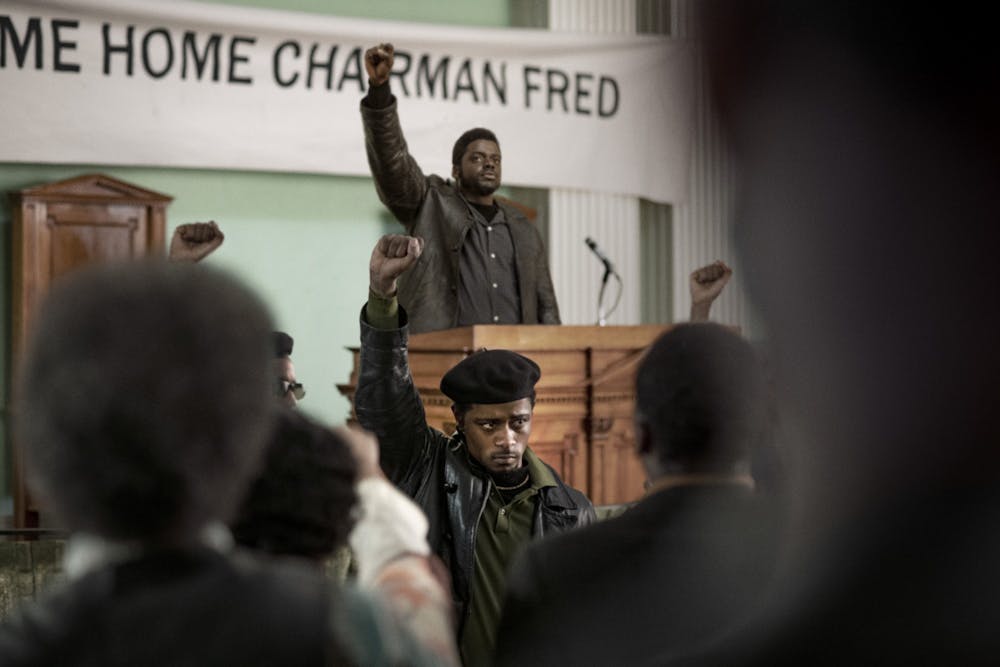“Judas and the Black Messiah,” hit theaters and HBO Max on Feb. 12. The film highlights the Black Panther Party and the life of activist Fred Hampton.
It follows William O’Neal, a man who was assigned by the FBI to keep tabs on Hampton and his plans for the Black Panther Party. As the film progress, O’Neal becomes more involved with the party, running errands and taking over when Hampton went to jail, and is ultimately tasked with setting Hampton up for murder.
In the film, police brutality against the Black Panther Party was displayed. Although the organization fought back, armed and all, some members lost their lives or were imprisoned. Furthermore, the infiltration and surveillance tactics used by the FBI were on full display.
“It was just so sickening to see that people who were actively fighting for justice and rights that Black people deserve were brutally murdered,” IU junior Carrington Parran said “It also made me disappointed to see other black people actively working against the movement.”
The Black Panther Party was a political organization founded by Huey Newton and Bobby Seale in 1966. The purpose of the organization was to fight back against police brutality in the African American community. Although the group was seen as a terrorist organization by the FBI, the Black Panther Party provided breakfast and security for Black individuals.
The free breakfast program was implemented from 1969 to the early 1970s, feeding thousands of hungry children. The program contributed to the development of federal free breakfast programs today. The party noticed the breakfast helped students stay awake and focused in class, according to their teachers.
Fred Hampton joined the Illinois chapter of the party in 1968 and was granted the position of deputy chairman. He organized rallies, established the free breakfast program and arranged a peace pact between rival gangs. As Hampton began to gain recognition and promote solitude among multiple communities, he became a target for the FBI.
“We say you don't fight racism with racism. We're gonna fight racism with solidarity. We say you don't fight capitalism with no black capitalism; you fight capitalism with socialism,” Hampton said in his 1969 speech "Power Anywhere Where There’s People’".
As shown in the film, the FBI was not happy with Hampton and his radical attitude towards revolution being the only solution. So they hired an informant to follow him.
At the age of 17, William O’Neal had an extensive criminal record. O’Neil first got involved with the FBI after being caught with a fake FBI badge. The FBI used him around 1968 to infiltrate the Black Panther Party. He was paid $300 a month for his information on the Black Panther Party’s and Hampton’s plans.
“Do I feel like I betrayed someone? Absolutely not. I had no allegiance to the Panthers,” O’Neal told an interviewer for the docuseries “Eyes on the Prize II” in 1990. Nine-months after the interview, O’Neal died by suicide.
Lakeith Stanfield, the actor who portrays O’Neal in the film, told Level earlier this month that he had trouble adjusting to the character.
“It was one of the hardest things I’ve ever had to do,” Stanfield said.
He said the role felt too real to him and gave him trouble while trying to connect with O’Neal. According to People Magazine, Stanfield’s body thought the things he was acting out were real.
He really felt as if he was betraying Hamptom, therefore, he was stressed and experienced panic attacks. These attacks led him to a therapist who he has now been having sessions with on a regular basis. One scene in particular Stanfield said he had trouble filming was when he had to poison Hampton.
His nerves felt as though he was actually poisoning his co-star, Daniel Kaluuya. His brain couldn’t separate reality from fiction. Stanfield said he felt guilt behind his two-faced character.
“I kept thinking about how William O’Neal was also an actual person who actually infiltrated the party and how his guilt became too much for him and resulted in him committing suicide,” Parran said. “Part of me feels bad for him, but another part of me does not.”
On another note, the film sheds light on government actions toward revolutionary groups. The problems in the film are still ones we live with today.
“Racism is still rampant and I believe that the government is still actively working against whatever progress that Black people make,” Parran said. “Today, Black people are still constant victims of police brutality and other injustices. In the same way that Fred Hampton’s murder was deemed a justifiable homicide, officers that murder unarmed, innocent Black people are still being aquited of charges.”






